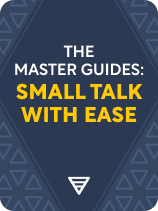

This article is an excerpt from the Shortform book guide to "The Master Guides: Small Talk With Ease" by Shortform. Shortform has the world's best summaries and analyses of books you should be reading.
Like this article? Sign up for a free trial here.
Do you feel uneasy about attending social events? Do you lack confidence when talking to people outside of your social circle?
It’s easy to think that you need to change something about yourself before you can boldly meet new people. But, communication experts say that the solution entails looking outward at others rather than inward at yourself. Also, some strategic preparation can go a long way.
Continue reading to learn how to overcome social anxiety and shyness by focusing on others and coming prepared.
The Key to Conversing Confidently
Many people feel socially anxious and hold back from approaching new people because they believe they’re not good at talking to others. Communication experts have this advice for how to overcome social anxiety and shyness: The first step is to recognize what makes people want to interact with you. They agree that the only thing you need to be good at when meeting new people is making them feel good about themselves.
People want to feel liked: In How to Talk to Anyone, communications expert Leil Lowndes argues that the need to be liked governs all social interactions. When people are unsure about whether you like them, they feel self-conscious. This makes them feel uncomfortable and they struggle to engage with you. On the other hand, when they’re sure that you like them, they feel at ease around you and enjoy your company—they like you because you make it easy for them to feel good about themselves.
People want to feel interesting: Self-proclaimed “recovering awkward person” Vanessa Van Edwards (Captivate) explains: When you’re genuinely interested in other people, they find you interesting too because of the “reciprocity effect,” a phenomenon where we like being with people who clearly like us, and we mirror the positive behavior they display toward us.
People want to feel important: Meanwhile, best-selling self-help author Dale Carnegie (How to Win Friends and Influence People) theorizes that more than anything else, the thing people want from their social lives is to feel important. In his eyes, people need feelings of “importance” as much as food or sleep.
To sum up, if you make people feel liked, interesting, and important, they’ll like you and enjoy engaging with you.
Plan Your Approach
You’ll feel more confident about interacting with new people if you plan your approach before you attend social events. This involves being intentional about who you want to meet, where you want to meet them, and what you want to say to them.
Who Do You Want to Meet?
You’re more likely to make others feel good and engage in confident conversations if you talk to people that make you feel good.
Van Edwards suggests that you can identify such people by thinking about those currently in your life who value and support you, so you can be on the lookout for people with similar characteristics. These might be people who eagerly help you achieve your personal and professional goals, who you feel comfortable reaching out to in a time of crisis, or who simply make you feel good about yourself.
Once you have an idea of the type of people who make you feel good, consider what types of situations you’re likely to find them in.
Where Do You Want to Meet Them?
You’re more likely to make others feel good and engage in confident conversations if you attend events where you feel happy and comfortable.
Van Edwards recommends that you make a list of all the settings you love, loathe, and feel OK about, then accept invitations in places you love, reject ones in places you loathe, and take time to consider the ones that are in the locations you feel OK in. For example, do you find bars loud and overwhelming? If so, it’s probably best to avoid them since you’ll feel uncomfortable and have a hard time engaging with others. Do you love the feel of an intimate coffeehouse? If so, go there, because you’ll feel in your element and will naturally project confidence that will attract others.
However, Lowndes warns that restricting yourself to specific situations and activities limits your ability to engage with people who have other interests. The more you try out or read about different activities, the easier you’ll find it to communicate with a wider range of people.
What Do You Want to Say to Them?
You’re more likely to make others feel good and engage in confident conversations if you prepare what to say in advance. This involves thinking about what kinds of topics you’ll be expected to talk about, preparing questions that make it easy for people to engage with you, and coming up with compelling responses to common questions you’ll likely be asked.
Method #1: Find Out Who’ll Be There
Before attending any event, find out who’ll be there—will it include people from a single profession or interest group? According to Lowndes, knowing what types of conversations you’ll be expected to engage in will indicate what topics you should brush up on.
Method #2: Create a List of Thought-Provoking Questions
In The Fine Art of Small Talk, speaker and communication expert Debra Fine suggests that you prepare specific questions about the person (or people) you want to meet, the event, or the situation. Her examples of the kinds of questions you can prepare include:
- What’s your favorite way to relax after work?
- What do you like about [open mic night, Amber’s parties, the Smithsonian]?
- Have you ever been to [a protest, a seminar, a meetup] like this before?
- Are you from around here? Are there any local events I should know about?
Lowndes adds to this by suggesting that you stay up to date on current affairs so that you can find common topics to discuss.
Method #3: Craft Stimulating Responses to Common Questions
When people first meet each other, they usually ask two questions: “Where are you from?” and “What do you do?” Normally, they each respond with fact-based answers—for example, “I’m from New York and I’m an engineer.” But, Lowndes argues, this sort of answer shuts down a conversation—if your conversation partner’s never been to New York or knows nothing about engineering, they won’t know how to continue the conversation.
Instead, Lowndes suggests extending your responses to these two questions in a way that stimulates a response—by using interesting facts, jokes, or general observations. This requires coming up with different variations depending on who you’re talking to and the social context you’re in. If you’re seeking to make friends, keep your responses fun and general. For example, “I’m from X—where they make the best goat’s cheese in the world.” If you’re talking to them for networking purposes, consider what interest this person could have in you or your work and include that in your response. For example, “I’m an engineer and have been working on X for the past two years.”
Exercise: Plan Your Approach
Think about how you can prepare to approach new people at an upcoming social event or occasion.
- Write down an event you’ll be attending soon where you’ll meet new people. Now, list the types of people who’ll be there, noting their professions or interests. (For example, you’re attending a book club and will be meeting literature enthusiasts.)
- Based on what you wrote, list two thought-provoking questions you might ask to initiate a conversation. (For example, “What’s the most memorable book you’ve read recently?” and “If you could recommend one book that had a significant impact on your life, which one would it be?”)
- Write down at least one way you might respond to the questions, “Where are you from?” and “What do you do?” in a way that stimulates a response. (For example, “I’m from a city nestled between mountains and surrounded by lush forests.” and “During the day, I’m a website designer, and I spend my evenings playing jazz piano.”)
- Now that you’re prepared, how do you feel about the prospect of attending the event? (For example, does being ready give you a feeling of confidence?) Do you feel it’s worth preparing like this in the future? Explain your answers.

———End of Preview———
Like what you just read? Read the rest of the world's best book summary and analysis of Shortform's "The Master Guides: Small Talk With Ease" at Shortform.
Here's what you'll find in our full The Master Guides: Small Talk With Ease summary:
- How to confidently approach and engage in conversations with new people
- Suggestions and techniques from a range of authors and experts
- Techniques to appear more approachable—without saying a word






